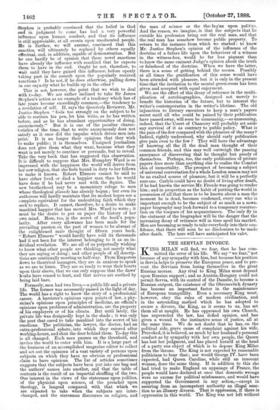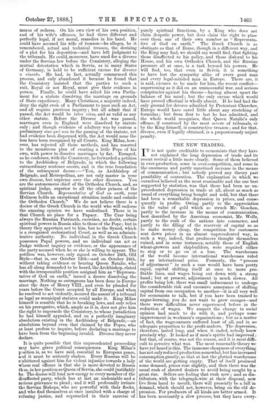THE SERVLIN DIVORCE. K ING MILAN will find, we fear, that
he has com- mitted the error of his life. We say "we fear," not because of any sympathy with him, but because his position in Servia helps to preserve the European peace, and to pre- vent the Servians from losing themselves in the great Russian morass. Any rival to King Milan must depend upon Russian support ; and as Austria-Hungary could not permit Servia, with its control of the Danube, to become a Russian outpost, the existence of the Obrenovitch dynasty has become an important factor in the maintenance of European tranquillity. Even a necessary King must, however, obey the rules of modern civilisation, and in the astounding method which he has adopted to secure a divorce, the King, as it seems to us, has set them all at naught. He has oppressed his own Church, has superseded the law, has defied opinion, and has given a wound to the instinctive sense of justice, all at the same time. We do not doubt that he has, on the political side, grave cause of complaint against his wife. Provoked, it is believed, as much by her husband's personal conduct as by sympathy with her own people, the Queen has lost her judgment, and has placed herself at the head of a party one object of which is to depose King Milan from the throne. The King is not expected by reasonable politicians to bear that; nor would George IV. have been expected, had Queen. Caroline, while still an innocent woman, done the same thing. If in addition to this she had. tried to make England an appanage of France, the people would have declared at once that domestic wrongs were no excuse for political misfeasance, and would have supported the Government in any action,—except in securing from an incompetent authority an illegal sanc- tion to an illusory divorce. That is oppression, if there is oppression in this world. The King was not left without means of redress. On his own view of his own position, and of his wife's offences, he had three different and perfectly legal, if not moral, remedies in his hand. He could have accused his wife of treason—he alleges, be it remembered, actual and technical treason, the devising of a plot for his deposition—and have left judgment to the tribunals. He could, moreover, have sued for a divorce under the Servian law before the Consistory, alleging the mutual detestation which in Servia, as in many States of Germany, is held to be sufficient excuse for divorce a vinculo. He had, in fact, actually commenced this process, and only abandoned it because he found that the Consistory insisted that the parties to such a suit, Royal or not Royal, must give their evidence in person. Finally, he could have asked his own Parlia- ment for a statute dissolving the marriage on grounds of State expediency. Many Christians, a majority indeed, deny the right even of a Parliament to pass such an Act, and all require previous inquiry ; but all admit that if passed, the Act would be intra vires, and as valid as any other statute. Before the Divorce Act was passed, marriages even in England were dissolved by statute only ; and though evidence of adultery was by custom a preliminary sine qud non to the passing of the statute, yet had evidence been dispensed with, the Act would none the less have been recognised by all Courts. King Milan, how- ever, has rejected all these methods, and has resorted to the monstrous plan of creating a little Pope of his own, with power to dissolve marriages by fiat. Enraged, as he confesses, with the Consistory, he forwarded a petition to the Archbishop of Belgrade, in which the following extraordinary sentence occurs, and is the true foundation of the subsequent decree :—"You, as Archbishop of Belgrade, and Metropolitan, are not only master in your own diocese, but supreme over the other dioceses. You are the autonomous chief of the Orthodox Church, and, as spiritual judge, superior to all the other princes of the Servian Church. Representative of God on earth, your Holiness holds an exceptional situation inside and outside the Orthodox Church. We do not believe there is a doctor of the Greek Church in the world who will endorse the amazing opinion we have underlined. There is in that Church no place for a Papacy. The Czar being always the Russian Patriarch, exercises, no doubt, certain spiritual powers in Russia akin to those of the Pope ; but in theory they appertain not to him, but to the Synod, which is a recognised ecclesiastical Court, as well as an adminis- trative authority. No individual in the Greek Church possesses Papal powers, and no individual can act as Judge without inquiry or evidence, or the appearance of the party accused when he or she is willing to appear. The petition was, however, only signed on October 24th, Old Style—that is, our October 12th—and on October 24th, without taking evidence or hearing Queen Natalie, who has all along demanded to be heard, the Archbishop, elated with the irresponsible position assigned him as "Represen- tative of God on earth," issued a decree dissolving the marriage. Nothing so outrageous has been done in Europe since the days of Henry VIII., and even he pleaded for years before the Court accepted by all Europe, and when he resolved to act violently, secured the assent of a tribunal as legal as municipal statutes could make it. King Milan himself is sensible that he is breaking laws, and only relies on his prerogative, which, ample as it is, does not give him the right to supersede the Consistory, to whose jurisdiction he had himself appealed, and on a perfectly imaginary absolutism existing in the Archbishop of Belgrade,—an absolutism beyond even that claimed by the Popes, who at least profess to inquire, before declaring a marriage to have been from the beginning invalid. Divorce they never declare.
It is quite possible that this unprecedented proceeding may have grave political consequences. King Milan's position is, as we have said, essential to European peace, and it must be seriously shaken. Every Russian will be embittered against him for violent injustice towards a lady whose real offence is that she is more devoted to Russia thin, in her position as Queen of Servia„ she could justifiably be. The decree will lend new energy to every member of the disaffected party, which has at last an undeniable and a serious grievance to plead ; and it will profoundly irritate the Servian Bishops, who are powerful with their flocks, and who find themselves at once insulted with a charge of refusing justice, and superseded in their exercise of purely spiritual functions, by a King who does not claim despotic power, but does claim the right to place over them one of their own number as "Representa- tive of God on earth." The Greek Church is as obstinate as that of Rome, though in a different way, and the King may find, we should say would find, that fighting those disaffected to his policy, and those disloyal to his House, and his own Orthodox Church, and the Russian pressure all at once, is a task beyond his powers. He will find, too, that even in Servia it is something to have lost the sympathy alike of every good man and every legal-minded man in Europe. There are, it is said, excuses to be made for him, the recent conflict— supervening as it did on an unsuccessful war, and serious conspiracies against his throne—having almost upset the balance of his mind ; but the only excuse which would have proved effectual is wholly absent. If he had had the only ground for divorce admitted by Protestant Churches, Europe would have cared little about any stretching of formulas ; but from first to last he has admitted, and the whole world recognises, that Queen Natalie's only offence, if construed by the most severe of tribunals, or by the King himself, is constructive treason ; and for that, divorce, even if legally obtained, is a preposterously unjust penalty.







































 Previous page
Previous page